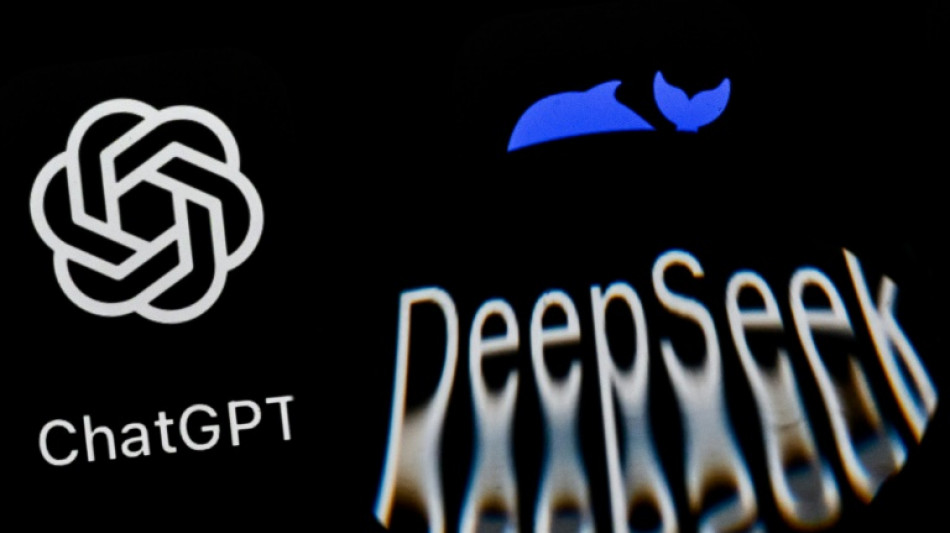
-
 Zuckerberg denies Meta bought rivals to conquer them
Zuckerberg denies Meta bought rivals to conquer them
-
Starc stars as Delhi beat Rajasthan in Super Over

-
 Weinstein asks to sleep in hospital, citing prison 'mistreatment'
Weinstein asks to sleep in hospital, citing prison 'mistreatment'
-
Amorim asks McIlroy to bring Masters magic to Man Utd

-
 Ruud keeps Barcelona Open defence on course
Ruud keeps Barcelona Open defence on course
-
Trump tariffs could put US Fed in a bind, Powell warns

-
 CONCACAF chief rejects 64-team World Cup plan for 2030
CONCACAF chief rejects 64-team World Cup plan for 2030
-
Putin praises Musk, compares him to Soviet space hero

-
 Son to miss Spurs' Europa League trip to Frankfurt
Son to miss Spurs' Europa League trip to Frankfurt
-
US senator in El Salvador seeking release of wrongly deported migrant

-
 Trump tariffs could put the US Fed in a bind, Powell warns
Trump tariffs could put the US Fed in a bind, Powell warns
-
US judge says 'probable cause' to hold Trump admin in contempt

-
 India opposition slams graft charges against Gandhis
India opposition slams graft charges against Gandhis
-
Nate Bargatze to host Emmys: organizers

-
 US Fed Chair warns of 'tension' between employment, inflation goals
US Fed Chair warns of 'tension' between employment, inflation goals
-
Trump touts trade talks, China calls out tariff 'blackmail'

-
 US judge says 'probable cause' to hold govt in contempt over deportations
US judge says 'probable cause' to hold govt in contempt over deportations
-
US eliminates unit countering foreign disinformation

-
 Germany sees 'worrying' record dry spell in early 2025
Germany sees 'worrying' record dry spell in early 2025
-
Israel says 30 percent of Gaza turned into buffer zone

-
 TikTok tests letting users add informative 'Footnotes'
TikTok tests letting users add informative 'Footnotes'
-
Global uncertainty will 'certainly' hit growth: World Bank president

-
 EU lists seven 'safe' countries of origin, tightening asylum rules
EU lists seven 'safe' countries of origin, tightening asylum rules
-
Chelsea fans must 'trust' the process despite blip, says Maresca

-
 Rebel rival government in Sudan 'not the answer': UK
Rebel rival government in Sudan 'not the answer': UK
-
Prague zoo breeds near-extinct Brazilian mergansers

-
 Macron to meet Rubio, Witkoff amid transatlantic tensions
Macron to meet Rubio, Witkoff amid transatlantic tensions
-
WTO chief says 'very concerned' as tariffs cut into global trade

-
 Sports bodies have 'no excuses' on trans rules after court ruling: campaigners
Sports bodies have 'no excuses' on trans rules after court ruling: campaigners
-
Zverev joins Shelton in Munich ATP quarters

-
 The Trump adviser who wants to rewrite the global financial system
The Trump adviser who wants to rewrite the global financial system
-
US senator travels to El Salvador over wrongly deported migrant

-
 UN watchdog chief says Iran 'not far' from nuclear bomb
UN watchdog chief says Iran 'not far' from nuclear bomb
-
Trump says 'joke' Harvard should be stripped of funds

-
 Macron vows punishment for French prison attackers
Macron vows punishment for French prison attackers
-
Canada central bank holds interest rate steady amid tariffs chaos

-
 Rubio headed to Paris for Ukraine war talks
Rubio headed to Paris for Ukraine war talks
-
Australian PM vows not to bow to Trump on national interest

-
 New attacks target France prison guard cars, home
New attacks target France prison guard cars, home
-
Global trade uncertainty could have 'severe negative consequences': WTO chief

-
 Google facing £5 bn UK lawsuit over ad searches: firms
Google facing £5 bn UK lawsuit over ad searches: firms
-
Onana to return in goal for Man Utd against Lyon: Amorim

-
 Tiktok bans user behind Gisele Pelicot 'starter kit' meme
Tiktok bans user behind Gisele Pelicot 'starter kit' meme
-
'Put it on': Dutch drive for bike helmets

-
 China's Xi meets Malaysian leaders, vows to 'safeguard' Asia allies
China's Xi meets Malaysian leaders, vows to 'safeguard' Asia allies
-
France urges release of jailed Russian journalists who covered Navalny

-
 Gabon striker Boupendza dies after 11th floor fall
Gabon striker Boupendza dies after 11th floor fall
-
UK top court rules definition of 'woman' based on sex at birth

-
 PSG keep Champions League bid alive, despite old ghosts reappearing
PSG keep Champions League bid alive, despite old ghosts reappearing
-
Stocks retreat as US hits Nvidia chip export to China


Does "vibe coding" make everyone a programmer?
Can a complete tech novice create a website using everyday language on ChatGPT?
That's the promise, misleading for some, of "vibe coding," the latest Silicon Valley catchphrase for an advance in generative AI that some say makes computer programming as simple as chatting online.
"You fully give in to the vibes, embrace exponentials, and forget that the code even exists," OpenAI co-founder and former Tesla employee Andrej Karpathy described in early February, in a message posted on X (formerly Twitter), using the term for the first time.
"I'm building a project or web app, but it's not really coding - I just see stuff, say stuff, run stuff, and copy paste stuff, and it mostly works," he said.
The developer and entrepreneur was referring to the new generative AI models that produce lines of code on demand in everyday language, through writing or speech.
The concept of "vibe coding" remained confined to the AI community until New York Times columnist Kevin Roose claimed to have created websites and apps without any knowledge of programming.
"Just having an idea, and a little patience, is usually enough," he wrote.
The ChatGPT and Claude interfaces can write an entire program line by line on demand, as can Gemini, which launched its dedicated version, Gemini Canvas, on Tuesday.
Other generative AI platforms specifically dedicated to coding have also made their mark in recent months, from Cursor to Loveable, or Bolt, Replit and Windsurf.
"Maybe, just maybe, we're looking at a fundamental shift in how software is created and who creates it," said online marketing specialist Mattheo Cellini on Substack.
"It's unlikely to make coding irrelevant, but it may change the way developers work," suggested Yangfeng Ji, professor of computer science at the University of Virginia.
"This could lead to some job displacement, particularly for those focused solely on basic coding tasks."
Even before "vibe coding," a downturn was being seen by some in IT employment as the first effects of generative AI began to be felt.
The sector shed nearly 10,000 jobs in the US in February, according to the Department of Labor, and its headcount is at a three-year low.
- Expertise needed? -
Among code novices, many find it hard to catch the vibe.
"People who do not have programming expertise often struggle to use these kinds of models because they don't have the right kinds of tools or knowledge to actually evaluate the output," said Nikola Banovic, professor of computer science at the University of Michigan.
On social media, the few newbies who report on their "vibe coding" quickly complain that it's not as easy as some want to believe.
Without mastering computing complexities like digital directories, runtime environments or application programming interfaces (APIs), it's hard to create an app that works.
Despite his coding knowhow, Claude Rubinson, a professor of sociology at the University of Houston-Downtown, wanted to create an application for his students two years ago without tinkering with the code generated by ChatGPT.
After a lot of trial and error, the app finally worked, but "I'm convinced it wouldn't have worked if I hadn't understood the code," which allowed him to guide the interface using the appropriate language.
This brought home the importance of the "prompt": mastering the request submitted to obtain the desired result.
"Programmers have certain levels of AI literacy that allows them to get what they want out of the models," said Banovic.
Everyday users "will not know how to prompt," h warned.
G.Frei--VB




